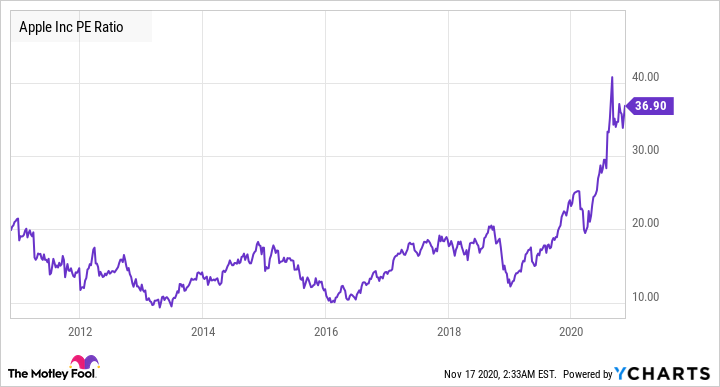It's 13F season, that time in the quarter when top hedge fund managers must disclose their buys and sells from the previous quarter ended Sept. 30. Also filing a 13F this week is Warren Buffett's holding company Berkshire Hathaway (BRK.A -0.30%) (BRK.B -0.24%).
Berkshire disclosed several trades in the pharmaceutical, telecom, and tech sectors, but many of those trades were smaller, and likely executed by his younger lieutenants Ted Weschler and Todd Combs. The largest Berkshire trade in the third quarter, which was likely executed by Buffett, was a surprising $4 billion sale of Apple (AAPL 0.33%) -- Berkshire's largest position and one of the most popular stocks in the market.
So, should Apple shareholders be panicking on the back of Berkshire's sales? For current holders, the answer is likely still no. For prospective buyers? It's more complicated.

Image source: The Motley Fool.
$4 billion is a drop in the bucket
First, it should be known that while Buffett's Apple sale was the "largest" trade of Berkshire's quarter, Buffett only trimmed about 3.7% of his entire Apple stake. Today, Berkshire's Apple stake is still worth a whopping $109.3 billion, making up 47.78% of Berkshire's equity portfolio.
There are a couple reasons investors shouldn't panic about the sales. First, Apple has been a massive home run for Berkshire, as the value of Berkshire's Apple holdings has more than tripled, and nearly quadrupled, in just four years (Berkshire began buying Apple in 2016, and continued buying for the next several years). As such, it's probably not a terrible idea to take some chips off the table.
Berkshire is also a risk-averse conglomerate that has insurance liabilities, so it's also possible the Apple stake merely became too big for even Buffett's comfort. It could be the case that Buffett gave himself a concentration limit of 50% to any one holding, since that would have been Apple's allocation in the Berkshire portfolio if Buffett hadn't sold any shares. Obviously, portfolio concentration is one of the ways Buffett aims to outperform the markets, but there still may be a limit to the degree to which he will concentrate Berkshire's fortunes. And of course, a 50% allocation is far higher than any mutual fund and most hedge funds would be willing to go.
Tax implications may have played a part
Another reason for Berkshire's sales could have been Buffett's anticipation of potential tax policy changes. Prior to the election, the polls pointed to a potential "blue wave," in which Democrats would take the White House, the House of Representatives, and the Senate. That would have meant a potential increase not only in the federal corporate tax, from 21% to 28%, but also a capital gains tax hike for high earners. As a massively profitable company, Apple's net earnings would have been affected going forward. Similarly, since Buffett is sitting on huge capital gains, a sale at a later date could have meant a higher tax bill after a potential capital gains tax increase.
However, now that the "blue wave" hasn't occured, and Senate control is still in question, those tax increases will, in all likelihood, not happen. Even if Democrats win the two run-off races in Georgia, it's an open question as to whether moderate Democrats would back the proposed tax increases. Therefore, the tax reasons for selling Apple before the end of the year are likely moot.
But if you're looking to establish a position...
While existing Apple shareholders in for the long haul probably shouldn't panic-sell on the Berkshire news, for those looking to potentially buy new Apple shares, now may not be the best time. Thanks to anticipation of the 5G super-cycle and investors giving more credence to Apple's service revenue, Apple's P/E multiple has basically tripled from what it used to trade at.
AAPL PE Ratio data by YCharts
Looking at this chart, it's no surprise that Buffett is taking some chips off the table. Given that Apple is now being given credit for its impeccable brand name and solid earnings prospects, there may not be much margin of safety left at these levels.
That's not, however, to say that Apple shares are in for any sort of crash -- merely that there may be better opportunities in other pockets of the market. In all likelihood, Apple will be trading higher over time. However, how much higher, and how long it may take to get there, may not equal the eye-popping gains of the last four years of Buffett's ownership.






